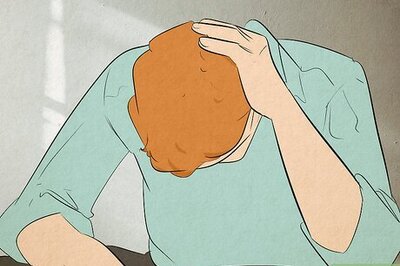
views
Our eyes being one of the most important sensory organs allows us to explore the world every day. They do so much more than we’re consciously aware of. Naturally, often times they ask for a little more care. A sore eye is a common condition that can affect anyone. It can be a pain and hinder our normal living. Understanding the cause behind them is the key to find restore their wellness. The reasons behind sore eyes can be something as little as spending too much time on screen to wearing contact lenses for too long or something more complex and serious as glaucoma or optic neuritis. Read on to find out what can cause sore eyes and how can they be treated.
Causes
Here are some common causes why you might be experiencing sore eyes:
Sinusitis: A very common reason behind sore eyes can be Sinusitis. The inflammation and pressure that builds up in the sinus region can be more uncomfortable for the eyes. The pain and pressure that can expand to the eyes can cause discomfort and irritation.
Blepharitis: When the oil glands in the eyelids get clogged, they can lead to inflamed eyelids causing irritation and swelling. Redness, Itching, as well as crusty eyelids, are some other symptoms to watch out for. To prevent further complications like styes or conjunctivitis, it is necessary to address this condition.
Conjunctivitis: This is yet another highly contagious condition that can cause sore eyes. Also known as pink eye, happens when the thin layer, of conjunctiva covering the white part of the eyes, becomes inflamed. Experiencing redness, itching, discharge, and sensitivity to light other than sore eyes are some symptoms of the condition.
Stye: It is a small, painful lump that can be developed on the eyelid. Infected or blocked oil glands in the eyelids can lead to this condition. Sore eyes accompanied by redness, swelling, and sensitivity to light can be the symptoms of stye. For preventing further infection and faster healing it is important to avoid touching or squeezing the stye.
Corneal abrasions: This is a scratch or a scrape on the surface of your cornea. It can result from something as simple as getting scratched by fingernails, makeup brushes, or even tree branches. Some other causes include rubbing your eye and having dry eyes. It can make someone feel like something is stuck in their eye, blurry vision, sensitivity to light, and red, painful, watery eyes.
Keratitis: A painful inflammation of the eye’s clear top layer known as the cornea. The causes behind this can be an infection or injury. It makes vision blurry and the eyes sensitive to light. Medical attention is required to avoid complications, including vision loss.
Glaucoma: A group of eye diseases that can result in vision loss and blindness. It is caused by damaging a nerve in the back of your eye known as the optic nerve. The symptoms start so slowly that most people may not notice them. The only diagnosis of this condition is through a comprehensive dilated eye exam.
Iritis: This is an inflammation of the iris and can appear with varying degrees of redness of the affected eye. It is often present with significant pain, sensitivity to light, tearing, and blurred vision. While it generally only affects one eye, some underlying systemic disease processes may end up affecting both eyes. In rare cases, there can be serious damage to the eye and even permanent loss of vision.
Optic Neuritis: This condition affects the eye and vision and occurs when the optic nerve is inflamed. Optic neuritis also causes pain. Due to the inflammation of the nerve fibres, the optic nerve can also start to swell. While it typically affects only one eye, sometimes both eyes can also be affected.
A Foreign Object: Often times the reason behind sore eyes can be something as simple as a foreign object. This can include dirt, dust, or even an eyelash. Rubbing your eye can make the situation worse. In the best-case scenario, one should try to remove the foreign object carefully by staying calm and avoiding any injuries.
Treatment
There are several home remedies that can alleviate eye irritation and provide relief. This can include applying warm compresses to the affected eye, rinsing the eye with water, using over-the-counter antihistamines or allergy medications to soothe itchy eyes, and using over-the-counter artificial tear drops to lubricate dry eyes.
Though if the eye irritation persists for more than one to two days or home remedies are ineffective, it is advisable to consult a healthcare provider. Depending on the cause of the irritation, a healthcare provider may recommend additional medical treatments such as antibiotics for bacterial eye infections, eyelid scrubs for blepharitis or dry eye, or prescription eye drops for allergies or dry eye. If an underlying medical condition is present, additional treatments may also be necessary.
Read all the Latest Lifestyle News here


















Comments
0 comment